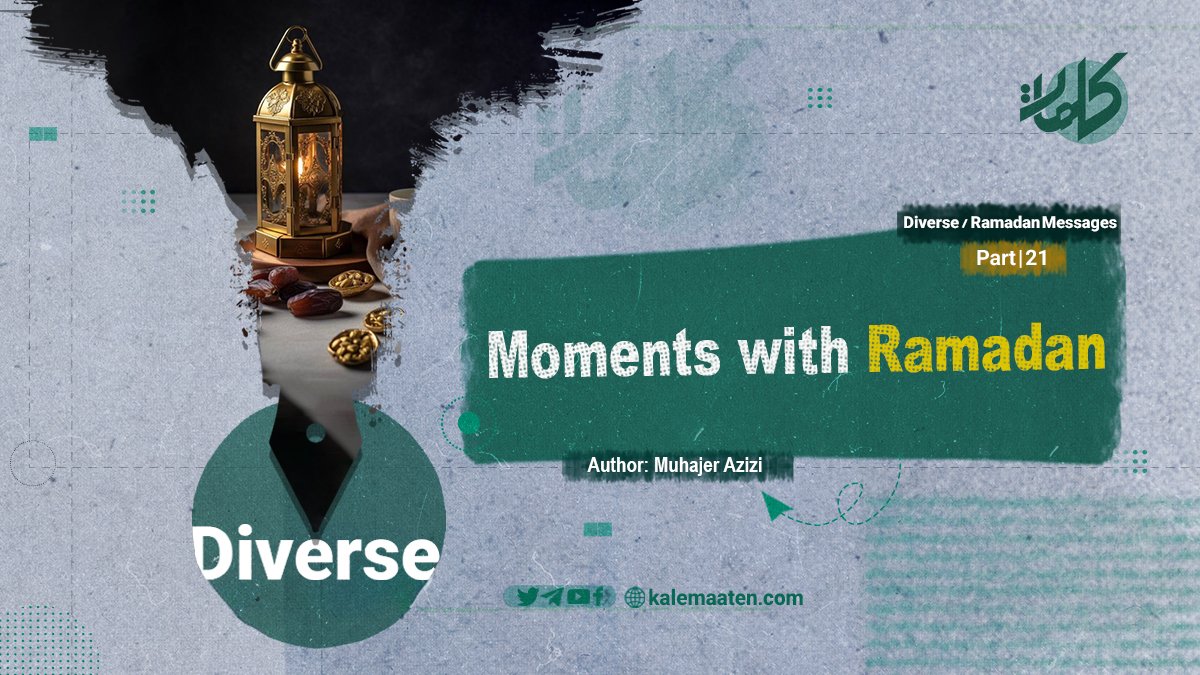
Author: Muhajer Azizi
Moments With Ramadan (Part 21)
How to Gain the Most Benefit from Ramadan?
4. Recitation of the Quran
How Can We Benefit from the Quran?
The Quran was revealed for guidance, enlightenment, and the benefit of its meanings and blessings. Reading its verses with reflection opens a gateway to a world of wonders and beauty. Through this, we learn the true way of life, and our souls and hearts gain freshness and vitality.
1. The Quran as a Means of Softening Hearts: Wahb ibn Ward said: “We searched among the sayings and admonitions, but we found nothing that softens hearts and brings more sorrow than the recitation and understanding of the Quran.”
Ibn al-Qayyim (MABH) emphasized: “Nothing is more beneficial for the heart than the recitation of the Quran with contemplation and reflection. The Quran encompasses all stages of the spiritual journey, the states of people, and the ranks of seekers of truth. If people knew the blessings of reciting the Quran thoughtfully, they would surely dedicate themselves to it and abandon everything else. Reciting one verse with contemplation is better than completing the Quran without reflection.”
2. Engaging All Aspects: To fully benefit from the Quran, our tongue, intellect, and heart must all participate in its recitation. Abu Hamid al-Ghazali said about Quran recitation: “A complete recitation of the Quran occurs when the tongue, intellect, and heart are all engaged. The tongue articulates the letters with proper intonation; the intellect grasps the meanings; and the heart takes heed and is moved. The tongue reads the words, the intellect translates them, and the heart absorbs the lesson.”
Allama Majd al-Hilali has mentioned practical methods that can help us benefit from the Quran, with the help of Allah. Here are some of those methods:
1. Pray Before Recitation: We should ask Allah to prepare our hearts to receive the light of the Quran and help us in contemplation. This supplication is significant in preparing the heart to accept the Quran. «وَمَا يَتَذَكَّرُ إِلَّا مَنْ يُنِيبُ فَادْعُوا اللَّهَ مُخْلِصِينَ لَهُ الدِّينَ» (Translation: “Only those who turn to Allah will take heed. So, call upon Allah, making your religion sincere to Him.”)
2. Recite Frequently and Build a Connection: Extend the duration of your recitation and choose a quiet place that is free from distractions to maintain focus. Performing ablution and using a miswak before reciting are also recommended.
3. Proper Recitation: Recite from the Mushaf with a loud and rhythmic tone (Tarteel), as this has a profound effect on emotions and strengthens faith in the heart.
4. Emotional Engagement: While reciting, pronounce the letters, elongations, and nasal sounds accurately to foster a deeper connection with the meanings of the verses. Reading with a sorrowful tone enhances the impact of the recitation.
5. Use a Brief Commentary: To better understand the verses, keep a short Tafsir nearby. However, refer to it after finishing the recitation to avoid interrupting the spiritual atmosphere of the Quran unless a specific word’s meaning is unclear.
We must cherish the precious opportunity that Ramadan provides and embrace the divine book through its recitation. It is best to read the Quran with contemplation so that this sacred book becomes our companion in both this world and the Hereafter.
Regrettably, some individuals let Ramadan pass without completing even a single recitation of the Quran, and at times, they do not even read a few pages. Is this not a significant deprivation of this unique spiritual opportunity?
Continues…


